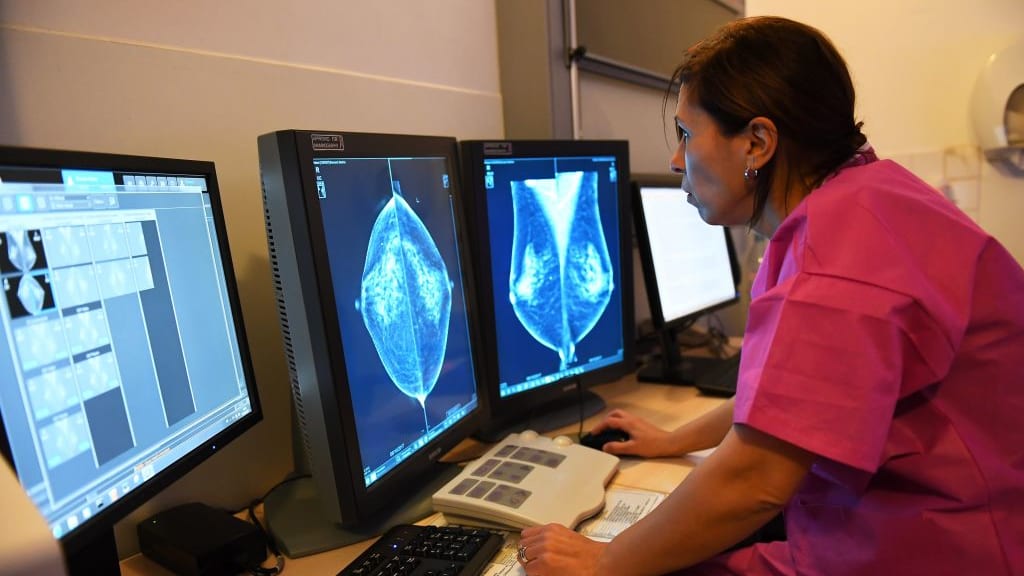AI software shows promising results in detecting breast cancer missed by doctors


A free daily email with the biggest news stories of the day – and the best features from TheWeek.com
You are now subscribed
Your newsletter sign-up was successful
In Hungary, early testing results show that artificial intelligence has an "impressive ability" to detect signs of breast cancer missed by doctors, The New York Times reports.
Dr. Edith Karpati, a radiologist, told the Times that when looking at hundreds of X-rays a day, "it's so easy to miss tiny lesions." Her son, Peter Kecskemethy, is the co-founder of Kheiron Medical Technologies, an AI software company that aims to assist doctors screening for breast cancer. The AI systems are fed millions of mammograms of patients whose diagnoses are known, as well as images labeled by radiologists to teach the AI to detect cancerous growths by their shapes, locations, and density, the Times reports. By then creating a mathematical representation of normal mammograms and those with cancers, the system compares that baseline to spot abnormalities in mammograms.
In 2022, after testing more than 275,000 breast cancer cases, Kheiron said its AI technology can spot cancer at least as well as doctors as the second reader of scans, and reduced the workload of radiologists by at least 30 percent. Additional testing at a clinic in Hungary found the AI software was able to identify more malignancies, increasing the cancer detection rate by 13 percent. "It's a huge breakthrough," Dr. András Vadászy, director of the MaMMA Klinika, told the Times. "If this process will save one or two lives, it will be worth it."
The Week
Escape your echo chamber. Get the facts behind the news, plus analysis from multiple perspectives.

Sign up for The Week's Free Newsletters
From our morning news briefing to a weekly Good News Newsletter, get the best of The Week delivered directly to your inbox.
From our morning news briefing to a weekly Good News Newsletter, get the best of The Week delivered directly to your inbox.
The technology is meant to be used alongside doctors, not to replace them, and more clinical trials are needed so the systems can produce accurate results on women of all ages, ethnicities, and body types.
A free daily email with the biggest news stories of the day – and the best features from TheWeek.com
Catherine Garcia has worked as a senior writer at The Week since 2014. Her writing and reporting have appeared in Entertainment Weekly, The New York Times, Wirecutter, NBC News and "The Book of Jezebel," among others. She's a graduate of the University of Redlands and the Columbia University Graduate School of Journalism.
-
 Political cartoons for February 16
Political cartoons for February 16Cartoons Monday’s political cartoons include President's Day, a valentine from the Epstein files, and more
-
 Regent Hong Kong: a tranquil haven with a prime waterfront spot
Regent Hong Kong: a tranquil haven with a prime waterfront spotThe Week Recommends The trendy hotel recently underwent an extensive two-year revamp
-
 The problem with diagnosing profound autism
The problem with diagnosing profound autismThe Explainer Experts are reconsidering the idea of autism as a spectrum, which could impact diagnoses and policy making for the condition
-
 5 recent breakthroughs in biology
5 recent breakthroughs in biologyIn depth From ancient bacteria, to modern cures, to future research
-
 Blue Origin launches Mars probes in NASA debut
Blue Origin launches Mars probes in NASA debutSpeed Read The New Glenn rocket is carrying small twin spacecraft toward Mars as part of NASA’s Escapade mission
-
 Dinosaurs were thriving before asteroid, study finds
Dinosaurs were thriving before asteroid, study findsSpeed Read The dinosaurs would not have gone extinct if not for the asteroid
-
 SpaceX breaks Starship losing streak in 10th test
SpaceX breaks Starship losing streak in 10th testspeed read The Starship rocket's test flight was largely successful, deploying eight dummy satellites during its hour in space
-
 Rabbits with 'horns' sighted across Colorado
Rabbits with 'horns' sighted across Coloradospeed read These creatures are infected with the 'mostly harmless' Shope papilloma virus
-
 Lithium shows promise in Alzheimer's study
Lithium shows promise in Alzheimer's studySpeed Read Potential new treatments could use small amounts of the common metal
-
 Scientists discover cause of massive sea star die-off
Scientists discover cause of massive sea star die-offSpeed Read A bacteria related to cholera has been found responsible for the deaths of more than 5 billion sea stars
-
 'Thriving' ecosystem found 30,000 feet undersea
'Thriving' ecosystem found 30,000 feet underseaSpeed Read Researchers discovered communities of creatures living in frigid, pitch-black waters under high pressure
